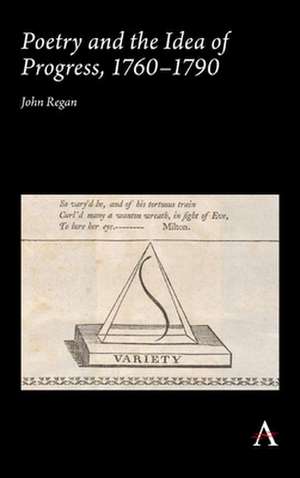POETRY AND THE IDEA OF PROGRESS 1760-90
Autor John Reganen Limba Engleză Hardback – 22 mar 2018
'Poetry and the Idea of Progress, 1760-1790' explores under-examined relationships between poetry and historiography between 1760 and 1790. These were the decades of Hugh Blair's 'Dissertation on the Poems of Ossian, the Son of Fingal' (1763) and 'Lectures on Rhetoric and Belles Lettres' (1783), Thomas Percy's 'Reliques of Ancient English Poetry' (1765), Adam Ferguson's 'Essay on the History of Civil Society' (1767) and Lord Monboddo's 'Of the Origin and Progress of Language' (1774). In these texts and many more, verse is examined for what it can tell the historian about the progress of enlightened man to civil society. By historicizing poetry, these theorists used it as a lens through which we might observe our development from savagery to 'polish', with oral verse often cited as proof of the backwardness or immaturity of man from which he has awoken.
'Poetry and the Idea of Progress, 1760-1790' deepens our understanding of the relationship between poetry and ideas of progress with sustained attention to aesthetic, historical, antiquarian and prosodic texts from these decades. In five case studies, this volume demonstrates how verse was employed to deliver deeply ambivalent reports on human progress. In this pre-'Romantic', pre-'Utilitarian' age, those reading verse with an eye to what it could convey about the journey towards the Enlightenment Republic of letters were in fact telling stories as subtle and ambiguous as the rhythms of the verse being read. Rather than focusing on a limited set of particular poets, 'Poetry and the Idea of Progress, 1760-1790' pays close attention to the theories of versification which were circulating in the later anglophone eighteenth century. With numerous examples from poems and writing on poetics, this book shows how the poetic line becomes a site at which one may make assertions about human development even as one may observe and appreciate the expressive effects of metred language.
The central contention of 'Poetry and the Idea of Progress, 1760-1790' is that the historians and theorists of the time did not merely instrumentalize verse in the construction of historical narratives of progress, but that attention to the particular characteristics of verse (rhythm and metre, line endings, stress contours, rhyme, etc.) had a kind of agency - it crucially reshaped - historical knowledge in the time. 'Poetry and the Idea of Progress, 1760-1790' is a sustained assertion that poetry makes appeals to what was known as one's 'taste', exerting aesthetic forces, and by so doing mediating one's understanding of human development. It claims that this mediation has a special shape and force that has never undergone sufficient exploration.
Preț: 674.21 lei
Preț vechi: 832.35 lei
-19% Nou
129.02€ • 140.10$ • 108.38£
Carte tipărită la comandă
Livrare economică 23 aprilie-07 mai
Specificații
ISBN-10: 1783087722
Pagini: 250
Dimensiuni: 152 x 229 x 25 mm
Greutate: 0.49 kg
Editura: Anthem Press
Notă biografică
John Regan is a research fellow in English literature at the University of Cambridge, UK. His research interests centre on the cultural dialogue between poetics and historical writing in the long eighteenth century.
Cuprins
Descriere
'Poetry and the Idea of Progress, 1760-1790' explores the role of poetry in eighteenth-century thinking on human progress. Its central contention is that the textural, verbal characteristics of poetry were a crucial form of response to ideas of human development. That is, the aesthetics of verse - how poetry appeals to the senses as well as to the intellect - constitute inadequately appreciated forms of response to the ideas of progress which were developing and gaining popular traction in Britain in the period 1760-1790.
